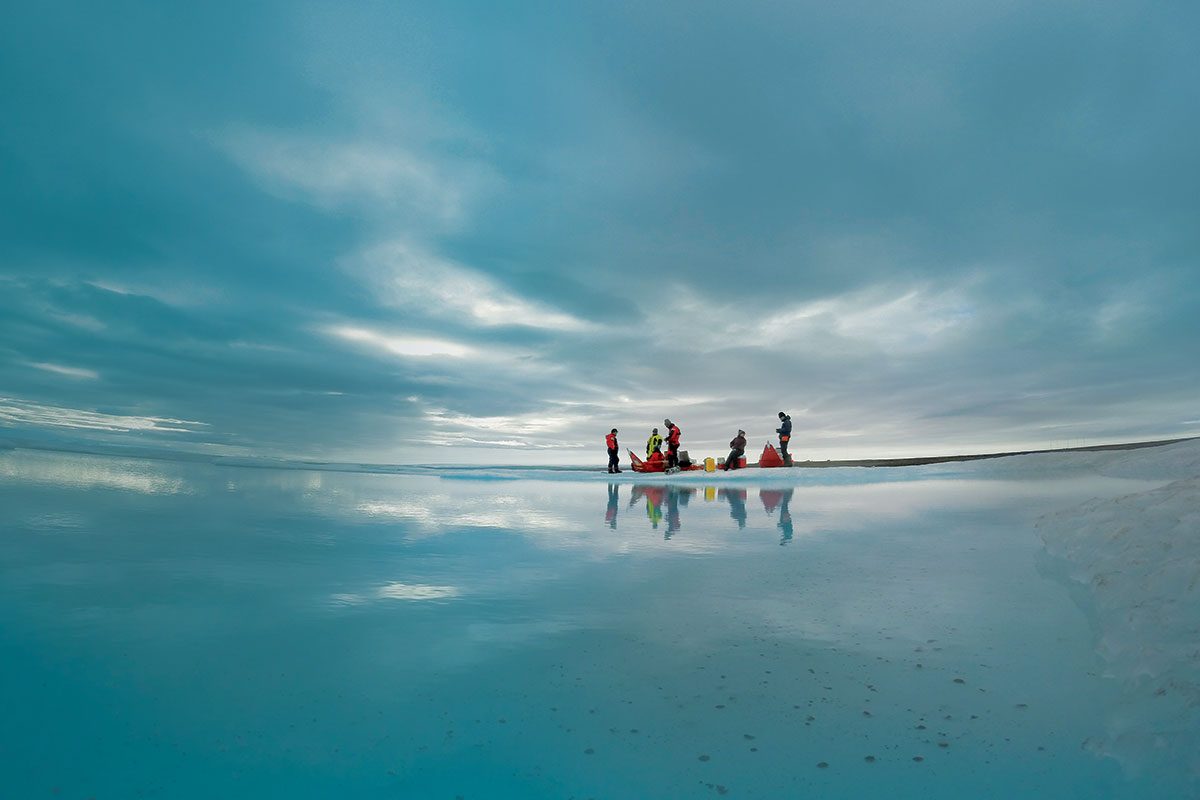
Søren Rysgaard, Virginie Galindo, Yubin Hu, Jens Ehn, Wieter Boone and Jørgen Bendtsen, near Station Nord, Northeast Greenland. // Photo by Wieter Boone
Climate change HQ
UM welcomes the world
Nowhere have the effects of climate change been more apparent – and more drastic – than the Arctic. It’s a fact researchers at the University of Manitoba have known and studied for decades through the Centre for Earth Observation Science (CEOS), one of the largest and most influential Arctic sea ice-focused research groups in the world.
“The Arctic is arguably experiencing the most change due to human and natural causes,” says Dr. John Iacozza, Director of CEOS. “These changes to the region are also having important consequences on the global system, including climate and biological systems in the middle latitudes where we live. We need to focus more attention on these changes in the Arctic in order to develop a global plan to deal with climate change.”
With the Arctic now one of the most important faces in the fight against climate change, CEOS is hosting the International Glaciological Society’s Sea Ice Symposium (IGS). The week-long conference will bring researchers and academics from around the world to Winnipeg to discuss the important role sea ice plays in global climate, polar marine ecosystems, globalization and Indigenous cultures. The symposium will also give CEOS the opportunity to show why Winnipeg is at the centre of Arctic research.
“This is the first time the symposium is in Canada, and Winnipeg is the natural gathering place for this conference,” says Iacozza. “The recent investments in Arctic research at the national, provincial and institutional levels, have furthered the University of Manitoba and the Centre for Earth Observation Science’s stature as world leaders in Arctic research. We’re excited to share our research with our colleagues from around the world.”
This year’s IGS conference will give researchers the chance to collaborate and hear from world-renowned sea ice and Arctic experts. The symposium will feature speakers from CEOS as well as NASA, the University of Tasmania and the Scripps Institution of Oceanography. The attendees will also explore Winnipeg and visit the University of Manitoba. After the conference is over, some participants will travel to Churchill to experience one of the most important Arctic research locations.
With two Canada Research Chairs, two Canada Excellence Chairs and one Canada 150 Chair, CEOS has become known for its high caliber research. The work that the Centre has done over the past 25 years has greatly impacted the global conversation on climate change and raised awareness of this important region of the world. CEOS has also become known for its approach to engaging students in research.
“CEOS has been able to document significant changes in the Arctic marine system, focusing on the interconnections between the physical, chemical and biological systems in the region,” says Iacozza. “One of the main impacts of our Arctic research program, and something we’re particularly proud of, has been the continual training of next generation Arctic researchers. Many of them have moved on to other institutions to continue the conversation on the changing Arctic System.”
For more information on the International Glaciological Society’s Sea Ice Symposium, please visit https://igswpg.com/.
Research at the University of Manitoba is partially supported by funding from the Government of Canada Research Support Fund.






